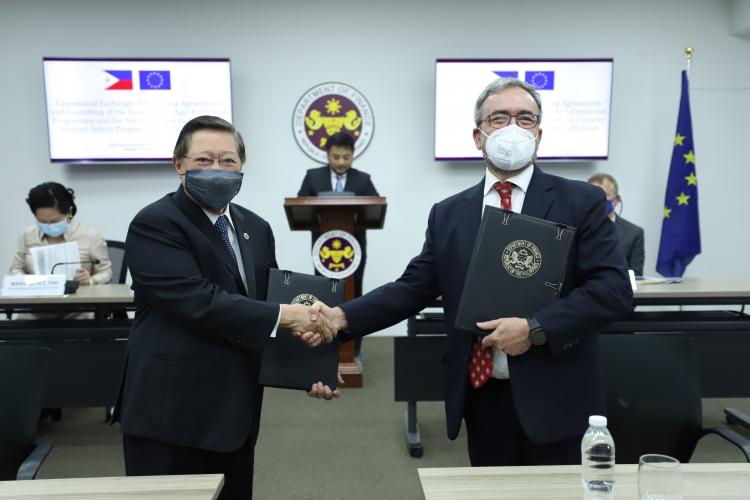
Finance Secretary Carlos Domimguez III (left) and EU Ambassador Luc Véron (right) share a hand shake after signing the financial agreements for two new programs aiming to boost agriculture production and strengthen disaster resilience in the country. (Photo from the EU Delegation to the Philippines)
MANILA, Philippines — The Philippines and the European Union (EU) signed on Wednesday financing agreements for two new programs aiming to boost local agriculture production and strengthen disaster resilience in the country.
The Bangsamoro Agri-Enterprise Programme (BAEP) will be implemented in a five-year period with a total budget of P1.14 billion, according to the EU Delegation to the Philippines.
“The programme will improve the quality and diversity of local agricultural production to respond better to the needs of the market and will support the transitional administration to elaborate a strategy to develop and attract investments in agri-business,” the EU statement read.
Meanwhile, the National Copernicus Capacity Support Action Programme for the Philippines (CopPhil) is a nationwide three-year program seeking to reduce the country’s vulnerability from natural disasters. It has a P570-million total budget.
Both programs will begin in 2022.
“The two Financing Agreements signed between the EU and the Government of the Philippines (GPH) will address the most pressing needs in the country: disaster preparedness and poverty reduction; and the cycle of vulnerability linking the two,” the EU delegation said.
“Today’s climate and health crises and their long-term effects make these assistance more relevant than ever,” it added.
According to the EU delegation, the two programs will be implemented in separate areas and are seen to contribute to the EU and the Philippines’ commitment to the “achievement of Sustainable Development Goals to support peace, development and prosperity, reduce inequality and fight climate change.”
“Understanding how our planet works and in particular how climate change affects it, is vital for sustainable economic growth and food security. Partnerships with an innovative public sector, a competitive business sector, and civil society are critical to success in these areas,” EU Ambassador Luc Véron said.
“In line with the principles of the European Green Deal, the Copernicus and Bangsamoro Agri-Enterprise programmes will enhance climate change resilience in the Philippines while strengthening key productive sectors including agriculture and ecosystem management,” he added.
Finance Secretary Carlos Domimguez III thanked the EU for its support to the administrations efforts to “boost farm productivity and achieve inclusive growth in the Bangsamoro Autonomous Region in Muslim Mindanao and further strengthen the country’s climate resilience in the face of global warming.”
BAEP
According to the details provided by the EU delegation, the BAEP seeks to work with local farmers and cooperatives to “adopt more integrated farming systems using a value chain approach, thus improving their capacities to increase quantity, quality and consistency of produce throughout the year.”
“On the commercialisation side, the BAEP will support the establishment of product standard quality systems for halal and sea-aqua products,” the EU statement further read.
The program also aims to ensure quality control, development of certification procedures and processes as well as the physical infrastructures, such as setting-up well-equipped modern laboratories and processing facilities.
“The programme will be assisting the BARMM agri-business sector to establish itself as an effective and recognized regional player and attractive investment opportunity, by facilitating the export of agri-products and processed food within the Brunei Darussalam-Indonesia-Malaysia- Philippines East ASEAN Growth Area trade corridor,” it added.
CopPhil
For the CopPhil, it seeks to support the Philippine government in strengthening the country’s resilience to natural disasters and climate change through “developing and leveraging Space Science and Technology application.”
“This is the first of its kind in the region,” the EU delegation said. “The initiative has a high potential to evolve into a global replicable concept transferable to other regions of the world.”
“The programme will employ an innovative approach to disaster reduction and climate adaptation using data from the EU Copernicus Earth Observation satellites and ground-based data collection systems,” it added.
“It will also support the Philippine Government’s capacities for decision-making and monitoring of policy implementation based on timely and accurate data,” it further said.
The European Space Agency, the Department of Science and Technology and the Philippine Space Agency will be implementing the program.
The program is seen to “contribute to the effective management of the environment and the natural resources of the Philippine ecosystems and improve the resilience of all livelihoods against natural hazards and climate change-related threats.”
“Through this cooperation, partners seek to deepen the common understanding of complex earth systems and human dynamics interplay across different disciplines and underpinning technology-based policies and strategies for sustainable development, resilience to climate change and economic growth,” the EU delegation said.

